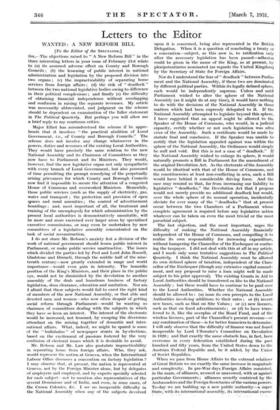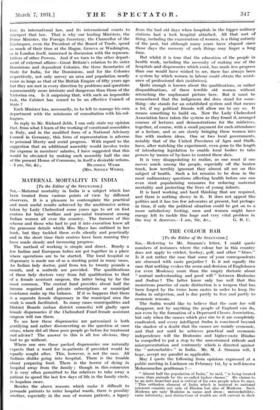Letters to the Editor
WANTED : A NEW REFORM BILL [To the Editor of the SPECTATOR.] SIR,—The objections raised to " A New Reform Bill " in the three interesting letters in your issue of February 21st relate to (a) its assumed adverse effect on County and Borough Councils ; (b) the lessening of public interest in national administration and legislation by the proposed division into two organs ; (c) the impracticability of separating home services from foreign affairs ;. (d) the risk of " deadlock " between the two national legislative bodies owing to difference in their political compleXions ; and finally (e) the difficulty of obtaining financial independence without overlapping and confusion in raising the separate revenues. My article was necessarily abbreviated, and judgment on the scheme should be dependent on examination of the fuller statement in The Political Quarterly. But perhaps you will allow me a brief reply to my courteous critics.
Major Elliot has misunderstood the scheme if he appre- hends that it involves " the practical abolition of Local Government, i.e., of County and Borough Councils." The scheme does not involve any change whatsoever in the powers, duties and revenues of the existing Local Authorities. They would have precisely the same relation to the new National Assembly and its Chairmen of Committees as they now have to Parliament and its Ministers. They would, however, find the new legislative organ not only sympathetic with every branch of Local Government, but also possessed of time permitting the prompt remedying of the perpetually arising grievances for which County and Borough Councils now find it impossible to secure the attention of a congested House of Commons and overworked Ministers. Meanwhile, those public services (such as the supply of electricity, gas, water and transport ; the protection and provision of open spaces and rural amenities ; the control of advertisement hoardings ; and, most important of all, the treatment and training of the unemployed) for which administration by the present local authorities is demonstratively unsuitable, will be more and more exercised over larger areas by specialized executive commissions, or may even be undertaken by new committees of a legislative assembly concentrated on the task of social reconstruction.
I do not share Mr. Robson's anxiety lest a division of the work of national government should lessen public interest in Parliament, or make public service unattractive. The issues which divided the parties led by Peel and Lord John Russell, Gladstone and Disraeli, through the middle half of the nine- teenth century—now greatly extended in range and world importance—would even gain in intensity. The honorific position of the King's Ministers, and their place in the public eye, would not be diminished by the devolution to another assembly of the drab and humdrum business of factory legislation, slum clearance, education and sanitation. Nor am I afraid that these subjects would fail to enrol the right kind of members of the new National Assembly, or that able and devoted men and women—who now often despair of • getting social reform through Parliament—would be- wanting as chairmen of committees dealing with the subjects in which they have so keen an interest. The interest of the electorate would :be increased,- not lessened, by escaping the diversions attendant on the mixing together of domestic and inter- national affairs. What, indeed, we might be spared is some of the " hullabaloo " of newspaper stunts in by-elections, based on the excitement of passions fostered by the very confusion of electoral issues which it is desirable to avoid.
Mr. Robson and Mr. Law also postulate impracticability
in separating home from foreign affairs. Who, they ask, would represent the nation at Geneva, when the International Labour Office discusses a convention on factory legislation ? I may observe that, at present, the nation is represented at Geneva, not by the Foreign Minister alone, but by delegates of employers and employed, and by experts specially selected for each subject—not to mention also representative§ of the several Dominions' and of India, and even;, in Some cases, of the Crown Colonies, tic. I see no insuperable difficulty in the National Assembly when any of the subjects devblved
upon it is concerned, being also represented in the British Delegation. When it is a question of concluding a treaty or a convention—subject, as this now is, to ratification only after the necessary legislation has been passed—adhesion could be given in the name of the King, as at present, by plenipotentiaries nominated (as regards the United Kingdom) by the Secretary of State for Foreign Affairs.
Nor do I understand the fear of " deadlock " between Parlia. ment and the National Assembly, if these two are dominated by different political parties. Within its legally defined sphere, each would be independently supreme. Unless and until Parliament wished to alter the sphere of the National Assembly (as it might do at any time), it would have nothing to do with the decisions of the National Assembly in those matters which had been expressly delegated to it. If the National Assembly attempted to legislate beyond this sphere, I have suggested that an appeal might be allowed to the Speaker of the House of Commons, who would, in a judicial capacity, certify whether or not such legislation was ultra vices of the Assembly. Such a certificate would be made by statute final and conclusive. If the Speaker was unable to certify that the legislation appealed against was within the sphere of the National Assembly, the Ordinance would simply be null and void. But this is not a case of " deadlock." If the National Assembly wished to enlarge its sphere, it would naturally promote a Bill in Parliament for the amendment of the original. Devolution Act. As the electorate of the Assembly would be identical with that of the House of Commons, and the constituencies at least non-conflicting in area, such a Bill would have behind it considerable driving force. And the case may remind us that, far from increasing our liability to legislative " deadlocks," the Devolution Act that I propose would not merely provide no additional deadlock but would, over the whole sphere of its normal operation, incidentally obviate for ever many of the " deadlocks " that at present occur between the two Chambers of a Parliament whose complete agreement is required before any legislative action whatever can be taken on even the most trivial or the most parochial subject.
The last objection, and the most important, urges the difficulty of making • the National Assembly financially independent of the House of Commons, and compelling it to realize its own responsibility for increasing expenditure, without hampering the Chancellor of the Exchequer or confus- ing the taxpayer. I did not deal with this at all in my article, and I made only some tentative suggestions in The Political Quarterly. I think the National Assembly must be allowed its own defined sphere of taxation, independent of the Chan- cellor of the Exchequer (though any extensive capital commit- ment, and any proposal to raise a loan might well be made subject to his prior approval). The existing Grants in Aid to Local Authorities should be transferred en bloc to the National Assembly ; but these would have to continue to be paid over to the Local Authorities. Whether the National Assembly should be allowed to : (a) issue its own precepts to the Local Authorities involving additions to their rates ; or (b) invent new taxes, such as that on Site Values ; or (c) new licences, such as that on fixed advertisements ; or (d) to have trans- ferred to it, like the overplus of the Road Fund, and of the wireless licences, part of the Chancellor's present revenue—or any combination of these—is for better financiers to determine. I will only observe that the difficulty of finance was-not found insuperable by Lord Ullswater's Committee on Devolution hi 1920 ; and that exactly the same obstacle has, in fact, been overcome in every federation established during the past hundred and fifty years, from the United States down to the Austrian Federal Republic and, be it added, by the Union of Soviet Republics:
When we pass from Home Affairs to the external relations of Great Britain we see exactly the same increase in magnitude and complexity. In pre-War days Foreign Affairs consisted, in the main, of alliances, avowed or unavcrwed, with or against particular Governments ; alliances secretly contrived by the
Ambassadors and the Foreign Secretaries of the-various powers. To-day" we are building -up a new public authority—a super State; =with its international assembly, its internationtil,execn- ' five, its international law, and its international courts to interpret that law. That is why our leading Ministers, the Prime Minister, the Foreign Secretary, the Chancellor of the Exchequer, even the President of the Board of Trade, spend so much of their time at the Hague, Geneva or Washington, or in London itself, immersed in discussion with the represen- tatives of other Powers. And if we turn to the other depart- ment of external affairs—Great Britain's relation to its sister Dominions and dependent Coloniei, the three Secretaries of State for India, for the Dominions, and for the Colonies respectively, not only survey an area and population nearly twice as -large as that of-the British Empire of fifty years ago but they are met in every direction by problems and questions immeasurably more intricate and dangerous than those of the Victorian era. Is it surprising that, with such an impossible task, the Cabinet has ceased to be an effective Council of State ?
Each Minister• has, necessarily, to be left to manage his own department with the minimum of consultation with his col- leagues.
In reply to Mr. Richard Jebb, I can only state my opinion that, from what I learn of the working of vocational assemblies in Italy, and in the modified form of a National Advisory Council in Germany, this form of representation is adverse to personal liberty and social progress. With regard to the suggestion that an additional assembly would involve twice the expense in members' salaries, I have suggested that this would be obviated by making each assembly half the size of the present House of Commons, in itself a desirable reform.
(Mrs. SIDNEY WEBB).



























































 Previous page
Previous page